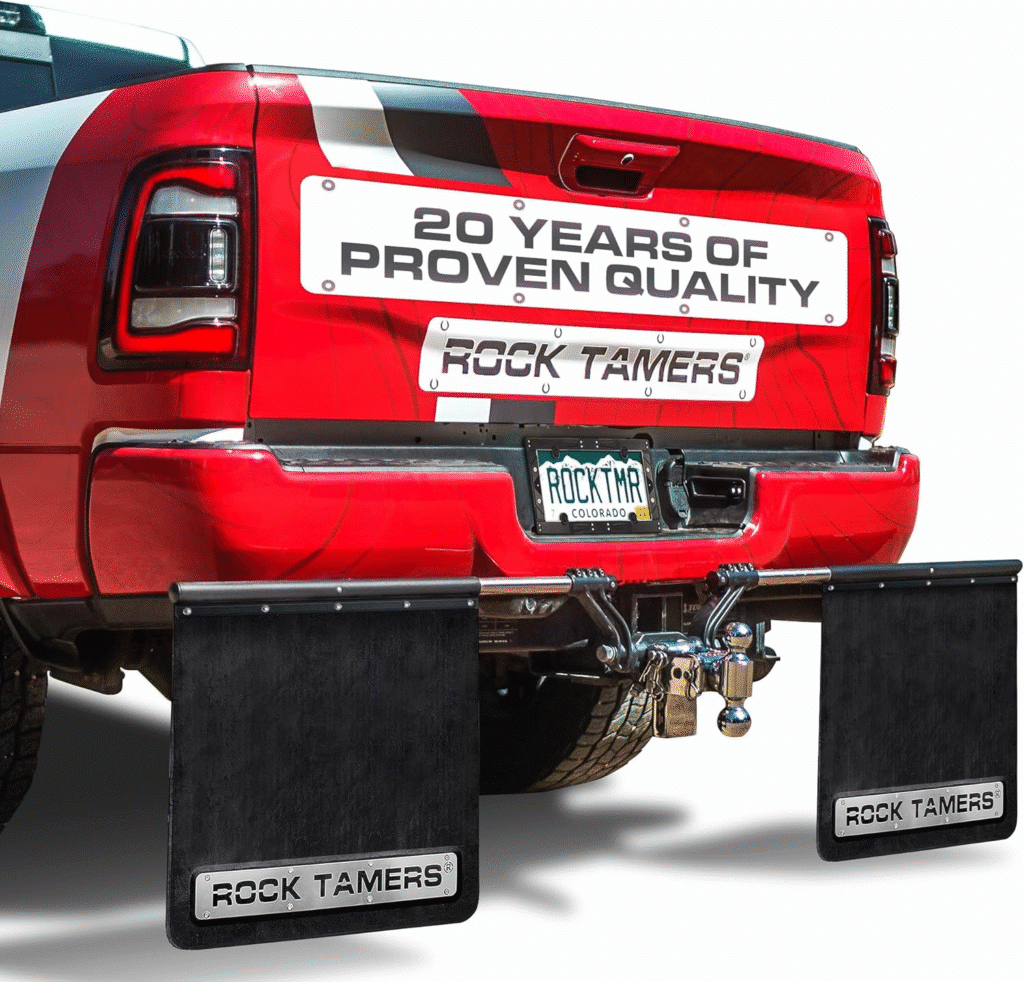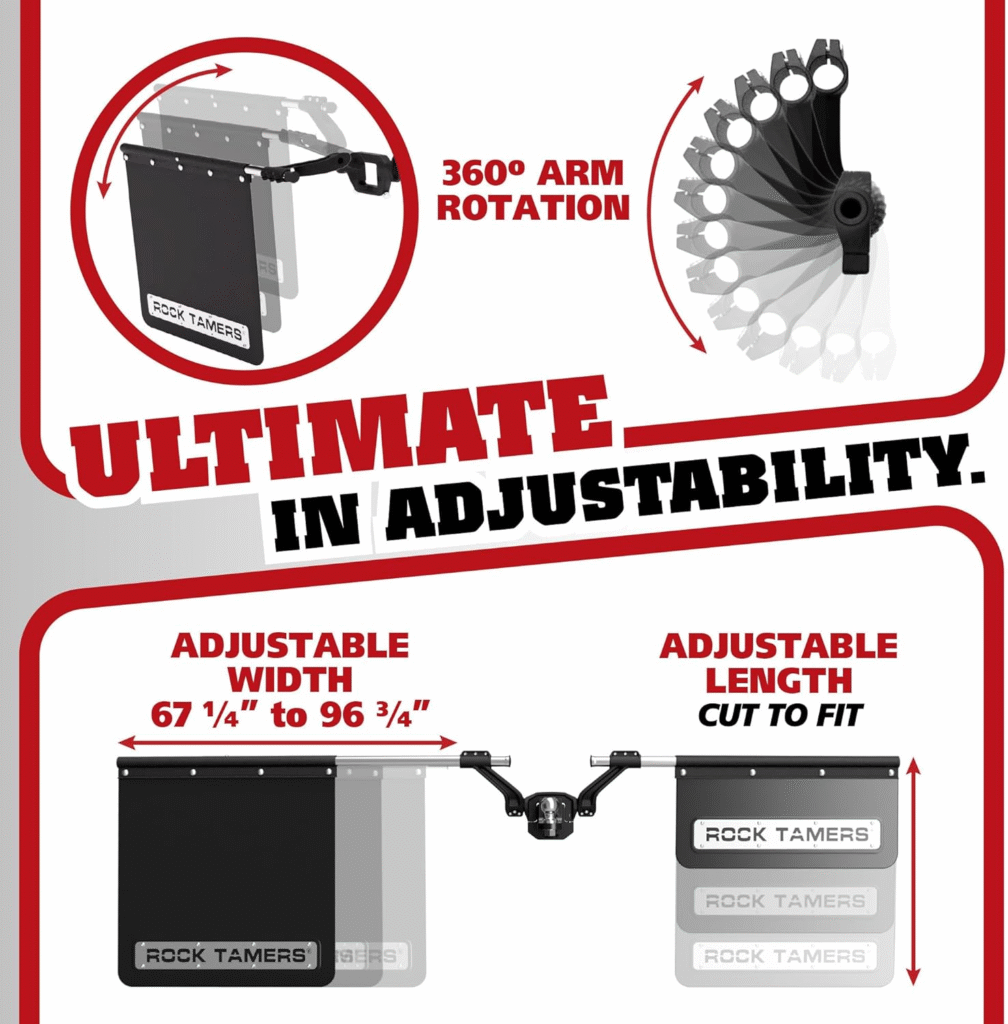You are cruising down the highway, towing your prized boat or camper, when *WHAM!* A rogue rock, kicked up by the vehicle ahead, slams into your trailer. The repair bill? Easily exceeding $1,000. I have witnessed this firsthand, and it underscores the critical need for reliable protection: installing hitch mud flaps.

Road debris is a menace. I have seen the carnage it inflicts. Think chipped paint, dented panels and cracked windshields. These are not isolated incidents; they are everyday occurrences for those who regularly tow. Hitch mud flaps serve as an essential shield, intercepting these projectiles before they can damage your vehicle and whatever you are towing. Consider them an inexpensive insurance policy against costly repairs.
- Safeguarding Your Vehicle: Mud flaps dramatically curtail the amount of road debris impacting your vehicle’s finish, thwarting those unsightly chips and preventing rust from taking hold.
- Trailer Preservation: Trailers are not immune. Mud flaps shield the trailer’s paint job and avert harm to lights, wiring and other vulnerable components.
- Boosting Safety: By diminishing the spray of water and flung debris, mud flaps enhance visibility for both you and other motorists, particularly during inclement weather.
- Legal Compliance: Numerous states mandate mud flap usage for vehicles engaged in towing. Consult your local regulations to confirm you are meeting these requirements.
Selecting the right hitch mud flaps hinges on your specific towing requirements. A range of options exists, each presenting distinct advantages. It is not a one size fits all situation.

- Universal Hitch Mud Flaps: Designed to accommodate a broad spectrum of vehicles and hitches. These typically affix to the receiver hitch and feature adjustable width and height settings.
- Custom Fit Hitch Mud Flaps: Engineered for particular vehicle makes and models, these provide a more precise fit, often minimizing the need for alterations during setup.
- Full Width Hitch Mud Flaps: Spanning the vehicle’s entire width, these offer maximum coverage, making them ideal for demanding towing applications and off road adventures.
- Brush Style Mud Flaps: Equipped with resilient bristles, these flaps effectively trap and divert debris before it can reach your vehicle or trailer, excelling in snowy conditions.
When evaluating hitch mud flaps, several key attributes warrant careful consideration. I personally weigh these aspects when assessing potential mud flap solutions. Do not gloss over these details; they can make all the difference in performance and longevity.
- Material Composition: Prioritize robust materials such as heavy duty rubber or reinforced plastic. These materials withstand harsh conditions and resist tearing.
- Size and Coverage Area: Ensure the mud flaps provide ample protection for your vehicle and trailer. Evaluate the flaps’ width and height, as well as the distance separating the hitch and the trailer.
- Adjustability Features: Adjustable mud flaps empower you to fine tune the fit and coverage to align with your specific towing configuration. This becomes invaluable if you routinely tow diverse trailers or utilize different vehicles.
- Installation Simplicity: Opt for mud flaps that offer straightforward installation and removal. Certain models necessitate drilling or modifications, whereas others simply bolt onto the receiver hitch.
- Long Term Durability: Invest in premium mud flaps engineered for longevity. Seek out attributes such as reinforced construction, ultraviolet resistance and defense against corrosion.
Setting up hitch mud flaps is generally a breeze. I have tackled numerous installations myself. While I always advocate consulting the manufacturer’s instructions for tailored guidance, here is a general outline of the process. Think of it as a starting point, not a rigid script.
- Tool Collection: Typically, you will require a wrench, socket set, measuring tape and possibly a drill, contingent on the specific model.
- Hitch Preparation: Thoroughly cleanse the receiver hitch, eliminating any rust or accumulated debris.
- Bracket Attachment: Affix the mounting brackets in accordance with the manufacturer’s directives. This might entail bolting them directly to the receiver hitch or leveraging pre existing mounting points.
- Mud Flap Securing: Fasten the mud flaps to the mounting brackets utilizing bolts or screws, ensuring correct alignment and adequate coverage.
- Height and Width Calibration: If the mud flaps incorporate adjustability, fine tune the height and width to harmonize with your precise towing arrangement.
- Post Installation Validation: Before commencing driving, meticulously verify that the mud flaps are securely fastened and do not impede the trailer or vehicle.
Maintenance
Sustaining your hitch mud flaps in prime condition for the long haul necessitates consistent maintenance. I recommend adhering to the following practices.
- Routine Cleaning Regimen: Regularly cleanse the mud flaps utilizing soap and water to eradicate accumulated dirt, grime and road salt.
- Periodic Inspection Protocol: Conduct routine inspections of the mud flaps, scrutinizing for indications of wear and tear, such as cracks, tears or loosened mounting hardware.
- Hardware Tightening: Routinely examine and tighten all bolts and screws to avert the mud flaps from becoming dislodged.
- Timely Replacement Strategy: In instances where the mud flaps sustain irreparable damage, promptly replace them to uphold optimal protection.
The marketplace features several reputable brands specializing in high quality hitch mud flaps. Based on extensive customer feedback analysis, here are some leading contenders. These brands have earned their stripes through consistent performance and customer satisfaction.
- WeatherTech: Renowned for their resilient and custom fit mud flaps.
- Husky Liners: Offers an extensive array of mud flaps tailored for diverse vehicle applications.
- Dee Zee: Provides economical and dependable mud flap solutions.
- Rock Tamers: Specializes in adjustable and heavy duty mud flap systems.
I frequently encounter recurring inquiries pertaining to hitch mud flaps. Here are some prevalent concerns alongside my informed guidance. Consider this your myth busting guide to mud flaps.
- “Will hitch mud flaps compromise my vehicle’s ground clearance?” When installed correctly, hitch mud flaps should exert minimal influence on ground clearance. Prioritize selecting a model that complements your vehicle and towing configuration.
- “Are hitch mud flaps cumbersome to install?” The majority of hitch mud flaps offer relatively straightforward installation, particularly those designed for direct bolting onto the receiver hitch. Nonetheless, certain models may necessitate drilling or modifications.
- “Do hitch mud flaps genuinely deliver tangible benefits?” Unquestionably! Hitch mud flaps safeguard your vehicle and trailer, mitigating damage and bolstering safety.
I have personally witnessed countless instances where hitch mud flaps have effectively shielded vehicles and trailers from harm. For example, a friend was en route to the lake, towing his boat, when a sizable rock was propelled upward by a passing semi truck. Absent the presence of hitch mud flaps, the rock would have undoubtedly shattered his boat’s windshield. Fortunately, the mud flaps diverted the projectile away from the boat.
On another occasion, I was traversing a construction zone when gravel was dislodged by the vehicle preceding mine. My hitch mud flaps effectively shielded my trailer’s paint from sustaining chips and scratches.
The ramifications of road debris extend beyond mere vehicular damage, encompassing ecological repercussions as well. Rocks, gravel and assorted materials can contaminate waterways, inflict harm upon vegetation and instigate soil erosion. By curtailing the volume of debris ejected by vehicles, hitch mud flaps contribute to minimizing this environmental burden. Every little bit helps.
While the upfront expenditure associated with hitch mud flaps might initially appear superfluous, it is imperative to contemplate the enduring advantages they confer. By shielding your vehicle and trailer from potential damage, mud flaps can yield substantial savings on repairs, maintenance and insurance premiums. Ultimately, they represent a judicious investment that recoups its cost over time.
The domain of hitch mud flap technology is in perpetual refinement. Manufacturers are actively experimenting with novel materials and designs intended to augment protection and augment durability. Furthermore, some are integrating advanced functionalities such as integrated lighting and sensor systems.
The optimal hitch mud flaps for your circumstances are contingent upon your individual requirements and lifestyle. Should you frequently engage in towing activities across gravel roads or within harsh weather conditions, prioritize investing in a heavy duty model to ensure peak protection. Conversely, if your towing activities are infrequent and predominantly confined to paved surfaces, a more basic model may suffice.
Securing hitch mud flaps constitutes a prudent measure for any individual who tows a trailer. They furnish indispensable protection for your vehicle and trailer, elevate safety standards and potentially conserve your financial resources. By meticulously selecting appropriate mud flaps and diligently maintaining them, you can derive years of worry free towing experiences. I wholeheartedly endorse these protective measures as a worthwhile endeavor.
